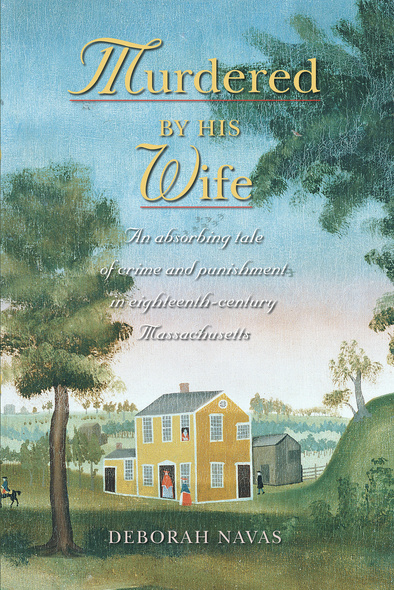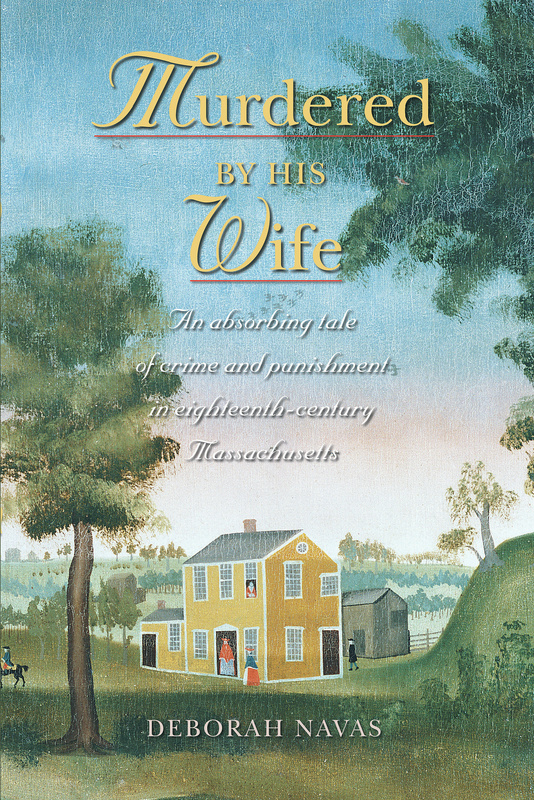In March 1778, Joshua Spooner, a wealthy gentleman farmer in Brookfield, Massachusetts, was beaten to death and his body stuffed down a well. Four people were hanged for the crime: two British soldiers, a young Continental soldier, and Spooner's wife, Bathsheba, who was charged with instigating the murder. She was thirty-two years old and five months pregnant when executed. Newspapers described the case as "the most extraordinary crime ever perpetrated in New England."
Murdered by His Wife provides a vivid reconstruction of this dramatic but little-known episode. Beautiful, intelligent, high-spirited, and witty, Bathsheba was the mother of three young children and in her own words felt "an utter aversion" for her husband, who was known to be an abusive drunk.
A year before the murder, she took in and nursed a sixteen-year-old Continental soldier who was returning from a year's enlistment under George Washington. The two became lovers and conceived a child. Divorces were all but impossible for women at that time and adulteresses were stripped to the waist and publicly whipped. Bathsheba's pregnancy occasioned a series of desperate plots to murder her husband, finally brought to fruition with the aid of two British deserters from General Burgoyne's defeated army.
The plots, the crime, the trial, and the aftermath are presented against a backdrop of revolutionary turmoil in Massachusetts. As the daughter of the state's most prominent and despised Loyalist, Bathsheba bore the brunt of the political, cultural, and gender prejudices of her day. When she sought a stay of execution to deliver her baby, the Massachusetts Council rejected her petition and she was promptly hanged before a crowd of 5,000 spectators.
Murdered by His Wife provides a vivid reconstruction of this dramatic but little-known episode. Beautiful, intelligent, high-spirited, and witty, Bathsheba was the mother of three young children and in her own words felt "an utter aversion" for her husband, who was known to be an abusive drunk.
A year before the murder, she took in and nursed a sixteen-year-old Continental soldier who was returning from a year's enlistment under George Washington. The two became lovers and conceived a child. Divorces were all but impossible for women at that time and adulteresses were stripped to the waist and publicly whipped. Bathsheba's pregnancy occasioned a series of desperate plots to murder her husband, finally brought to fruition with the aid of two British deserters from General Burgoyne's defeated army.
The plots, the crime, the trial, and the aftermath are presented against a backdrop of revolutionary turmoil in Massachusetts. As the daughter of the state's most prominent and despised Loyalist, Bathsheba bore the brunt of the political, cultural, and gender prejudices of her day. When she sought a stay of execution to deliver her baby, the Massachusetts Council rejected her petition and she was promptly hanged before a crowd of 5,000 spectators.
Navas has produced a little gem—rock hard and glistening. Her story itself has great intrinsic fascination (sex, violence, betrayal, even a kind of 'redemption'). But her telling of the story is best of all: so simple, so direct, so utterly compelling. In short, one feels a very gifted writer at work here.'—John Demos, author of The Unredeemed Captive
'PEN-Syndicated Fiction Award winner Navas's (Things We Lost, Gave Away, Bought High and Sold Low, 1992) nonfiction debut unearths the once-notorious Spooner murder of 1778, an event resonant with the concealed passions and darkness of Colonial Massachusetts. Repulsed by her husband, Bathsheba Spooner became sexually involved with an adolescent soldier from Washingtons army recuperating in her care. The resulting pregnancy induced a desperate situation familiar from our own century: She convinced him and two rogue British soldiers to do in her husband. The guilty parties were almost immediately apprehended while drinking at a local tavern, wearing the dead mans clothes. Although all four were ultimately hanged, the most venomous public execration was, not surprisingly, reserved for Bathsheba, whose petitions for a delay of execution until the birth of her child were summarily denied, providing a chilling early example of the death penaltys paradoxical cruelty. In a telling that is mostly nimbleif sometimes infatuated with digressive genealogyNavas revisits the case, noting especially the many quirky details that informed its tragic arc (the fact that Bathshebas father was a prominent, hated Loyalist, for example, surely influenced the punitive measures taken against his immature and probably delusional daughter). At the same time, she skillfully evokes the heady American late18th century, a time of revolutionary fervor, desperate militarized violence, and incipient lawlessness that was apparently less genteel and more frenzied than restorations like colonial Williamsburg acknowledgeand, like our own time, most unforgiving of transgressors. Navas brings an acutely contemporary critical eye to this lost era, revealing nuances of gender roles, piety, patriotism, and class within the actions of both killers and prosecutors that make this slim volume a colorful contribution to current historical dialogues.'—Kirkus Reviews
'This history...recounts a case as sensational to contemporaries as the O. J. Simpson trial was to us....'—Virginia Quarterly Review
'This well-written book exposes the harsh realities of life in revolutionary New England.'—Choice
An independent scholar, Deborah Navas worked as a magazine editor for twenty years. She is author of a short story collection, Things We Lost, Gave Away, Bought High and Sold Low, and won the PEN Syndicated Fiction Award and the New Hampshire Writers Project Emerging Writer Award.






